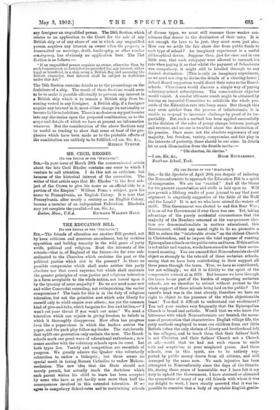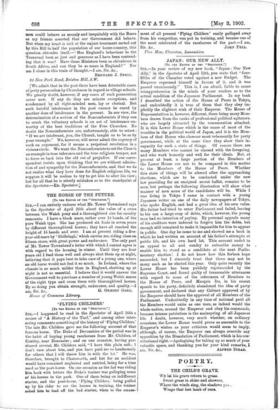[TO THZ EDITOR OP THE " SPECTATOR.,
Snr,—In the Spectator of April 26th you despair of inducing the Nonconformists to approach the Education Bill in a spirit of compromise. We are too "excited." And all the blame for the present exacerbation and strife is laid upon us. Will you permit a lifelong reader of your journal to say that your argument is singularly suggestive of the fable of the Wolf and the Lamb ? It is not we who have stirred the waters of strife. This Government was elected to end this Boer War; it is an ad hoc Government if ever there was one. Yet, taking advantage of the purely accidental circumstance that the majority of the Members returned at the war-pressure elec- tion are denominationalists in matters educational, this Government, without any moral right to do so, promotes a Bill to relieve the "intolerable strain" on the richest Church in Christendom, and to impose the total expense of running Episcopalian schools on the public rates and taxes. If this action is not unfair and wanton, words have ceased to bear their accus- tomed meaning. You are amazed that Nonconformists should object so strongly to the rate-aid of these sectarian schools, seeing that we have been contributing to their support all these years through the taxes. True, we have so contributed, but not willingly ; we did it in fidelity to the spirit of the compromise arrived at in 1870. But because we have through the taxes borne part of the burden of supporting sectarian schools, are we therefore to submit without protest to the whole support of these schools being laid on the public? The camel's head was in the tent already, therefore we have no right to object to the presence of the whole objectionable beast! You find it difficult to understand our excitement? You tell your readers very frequently that the Episcopalian Church is broad and catholic. Would that we who know the bitterness with which Nonconformists are treated, the mean- ness of persecution that characterises English village life, the petty methods employed to wean our children from our little Bethels (often the only shrines of liberty and brotherhood left in the villages), and to teach them that their fathers' faith is not Christian and their fathers' Church not a Church at all,—would that we had not such reason to smile with sad scepticism at your misplaced praise. And these schools, run in this spirit, are to be entirely sup- ported by public money drawn from all citizens, and still managed by the same men. No such injustice has been attempted to Nonconformity since the days of the Stuarts. Sir, during these years of lamentable war I have felt it my duty to uphold the Government, I have strained or alienated the sympathies of many of my old friends with whom it was my delight to work, I have stoutly asserted that it was im- possible to conceive that a body of reputable English gentle-
men could behave as meanly and inequitably with the Boers as my friends asserted that our Government did behave. But when my heart is sick at the unjust treatment meted out by this Bill to half the population of our home-country, this question obtrudes itself,—" Has England's behaviour to the Transvaal been as just and generous as I have been contend- ing that it was ? Have these Ministers been so chivalrous in South Africa, and can they be so mean in England ?" Nor am I alone in this train of thought.—I am, Sir, &c., BERNARD J. SNELL. 94 New Park Road, Brixton Hill, S. PT.
[We admit that in the past there have been detestable eases of petty persecution by Churchmen in regard to village schools. We greatly doubt, however, if any cases of such persecution occur now. If any do they are minute exceptions, and condemned by all right-minded men, lay or clerical But such hateful intolerance in the past cannot be cured by another dose of intolerance in the present. In our view, the determination of a section of the Nonconformists if they can to crush the voluntary schools is an act of intolerance un- worthy of the best traditions of the Free Churches. No doubt the Nonconformists are, unfortunately, able to retort : "If we are intolerant, you, the Church, taught us to be so by your example." We, however, will never admit the cogency of such an argument, for it means a perpetual revolution in a vicious circle. We want the Nonconformists to set the Church an example in true tolerance and the true religious temper, not to force us back into the old rut of prejudice. If our corre- spondent insists upon thinking that we are without admira- tion of and sympathy for the Nonconformists, and that we do not realise what they have done for English religious life, we suppose it will be useless to try to get him to alter his view ; but for all that he is utterly mistaken as to the standpoint of the Spectator.—ED. Spectator.]











































 Previous page
Previous page